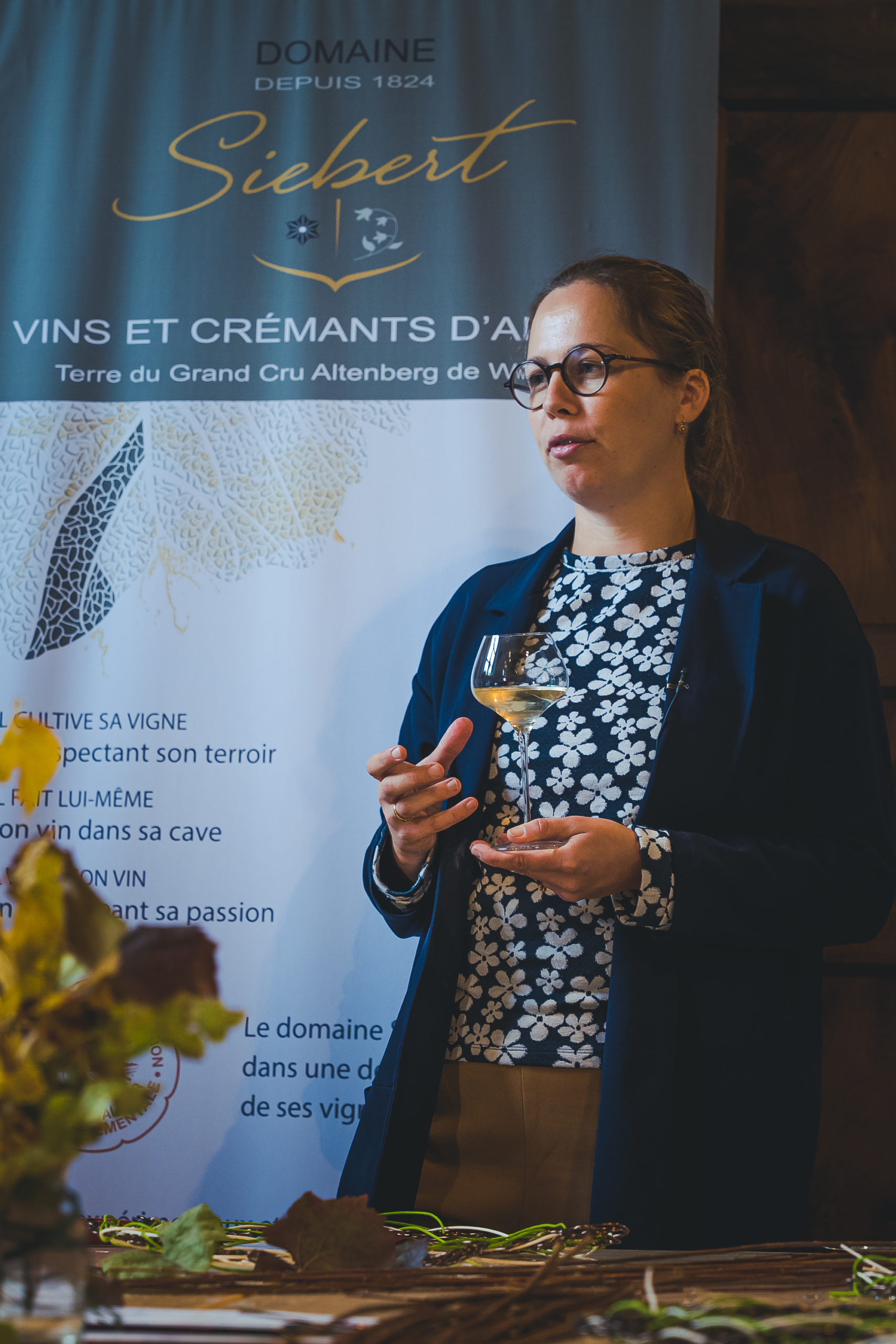Estelle was born in Picardy in 1992 and grew up in the countryside. Her
father, a cereal farmer at the “Ferme de Pienne” (a long history that goes
back to 1830), passed on to her his love for nature.
After studying biochemistry, ecology and environment, Estelle obtained
the National Diploma of Oenologist in 2016 in Reims. She started her
career in Champagne as assistant cellar master at Mailly Grand Cru for a
year.
She then crossed the globe to New Zealand for Pinot Noir vinification.
Afterwards, she worked on technical projects combining innovation,
quality and vinification in great houses such as Moët&Chandon, Ruinart,
Mercier and Dom Pérignon for several years.
Although she moved to Alsace to join her beloved, it was her meeting
with Bruno Siebert that was decisive. Estelle had been looking for a
challenge that would match her many skills.
An entrepreneur at heart, she has incredible energy in everything she
does. When Bruno presented his family-owned vineyard of 8 hectares,
fragmented in 26 different plots, she immediately perceived the vibrancy
and potential of the terroirs, whose are still little known but have deep
mineral soils, a good climate and parcels with varied profiles.
In Wolxheim, west of Strasbourg, Estelle finds her secret garden, her
inspiration, a place of feeling and life that allow her to express herself and
to produce wines in her image, confidential and sensitive.
Passionate about flowers, perfumes and photography, she will translate
her artistic universe into the philosophy she leads at Domaine Siebert.
Estelle has joined the core group from the Young Winemakers of Alsace to
build a better communication about the different terroirs in Alsace with
her winemaker friends. Estelle has also been welcomed by the “Divines
d’Alsace”, a group of women working in the wine industry who share their
ideas and their daily lives with their partners and colleagues in France. She
is also a member of the “Union des OEnologues de France” with the
Alsatian office.
The future of Domaine Siebert
Estelle is enthusiastic with her husband Simon Balzer, an agricultural
engineer and butcher, to raise the reputation of Alsatian terroir wines.
The plots are different biotops surrounded by trees, and grassy strips of
wild flowers. It is necessary to have a global approach of our domain, of
the environment, of the cultural practices and of the adequate tools of
winemaking to express the best potential from our plots.
“As for the future, it is not a matter of predicting it but of making it possible”
Antoine de Saint Exupéry

Domaine Siebert has always placed the human and the preservation of its heritage as a priority in its development.
The winery got the High Environmental Value (HVE) certification in 2019, which is the first step to prepare the future vineyard management.
These are the challenges given to our two partners, Comptoir Agricole and XVIGNE, give us technical support and useful advice in our project of agroforestry and implantation of flowering solutions in our plots.
We were lucky enough to welcome Olivier Zebic, a wine consultant and national expert in innovative eco responsible vineyards. We also work with Jérôme Courgey, expert in viticultural agro-equipment and Thomas Loew, viticultural consultant.
Thanks to the installation of soil pits on four plots of strategic interest in the understanding of our terroirs, we can orient our choices of management and our choices of plot based vinification.

Our efforts on shaping our landscapes are already visible through the planting of hedges and fruit trees and the maintenance of our wild banks and groves. You can also observe wild flowers such as the white poppy, wild orchids, blue muscaris. Our whole vineyard is grassed. We are looking to introduce new species of grasses, legumes and crucifers with grass such as pink clover, forage rye, forage pea, forage radish.
All our pomace (pressed grapes) are sent to a methanization center. We are attentive to the preservation of water. We have a rainwater recovery well for our cleaning operations with optimized rinsing times for our automated processes (presses, filtering, bottle cleaning).
The 2021 vintage marks the entry of plot-based winemaking within the winery in order to reveal the best potential in our wines. Estelle has chosen to surround herself with a friend and oenologist, Bertrand Praz, who is the general manager of CDM OEnologie Alsace. He helps us with his team of experts in oenology, microbiology, sparkling wines, and new processes, to develop our offer.
We try to surround ourselves with colleagues who understand our strategy and bring us new ideas, following our state of mind.

